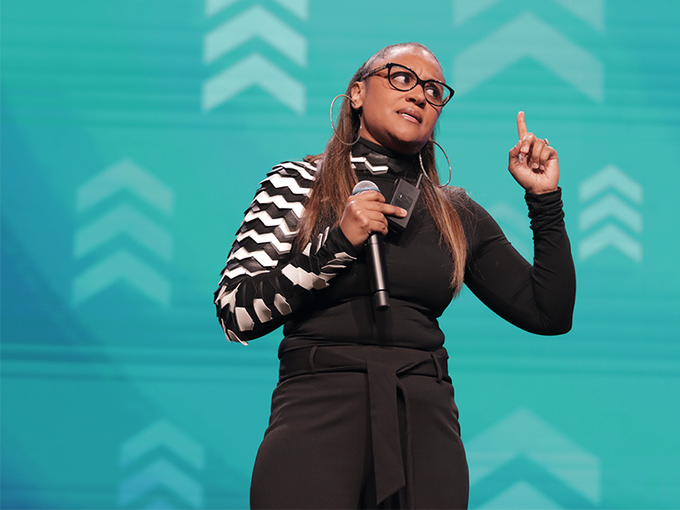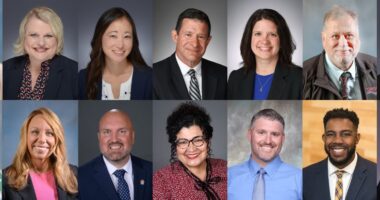Historically Responsive Education: Centering Genius, Justice, and Joy
Gholdy Muhammad advocated for education that recognizes every child's inherent genius, pursues justice, and prioritizes joy.

In the realm of education, few voices resonate as powerfully as Gholdy Muhammad’s. An associate professor of Literacy, Language, and Culture at the University of Illinois at Chicago, Muhammad’s journey from classroom teacher to bestselling author has been driven by a singular mission: to reframe curriculum and instruction through the lens of Black historical excellence.
Unearthing the Genius Within
During her keynote address during the 2025 UNITED: The National Conference on School Leadership, Muhammad spoke about her philosophy that hinges on a revolutionary idea: Genius is not the preserve of the elite few but rather a universal quality inherent in every child.
“You do not give a child their genius,” she asserts. “They already have it. It just needs to be grown and watered and nurtured.”
This powerful metaphor encapsulates her belief that educators are not bestowers of brilliance but instead cultivators of the innate potential within each child. It’s the brilliance, special qualities, creativities, power, uniqueness, natural abilities, skills, talents, and light held by every student.
But how do we nurture this genius? Muhammad advocates for a paradigm shift in our approach to education, one that centers on love, humanity, and culturally responsive teaching.
Justice: More Than Just Access
For Muhammad, justice in education goes beyond mere diversity or representation. It’s about liberation, equity, and addressing systemic structures that have historically marginalized and worked to erase certain groups.
For example, Muhammad talked about The New England Primer, the first textbook printed in America, in the 1600s. This textbook has six major problems in the curriculum. It:
- Centered whiteness;
- Lacked antiracism and social justice;
- Lacked representation of diverse humanity;
- Included English-only instruction;
- Taught and assessed in traditional ways; and
- Lacked joy.
Muhammad asked attendees to raise their hand if they see even one of these six problems in schools today. Hands flew up.
“If we see even one of these from the 1600s, it’s a problem,” said Muhammad. “It’s time for a new way forward in education.”
She pointed out the stark reality that only 17 percent of Black fourth-graders were reported as proficient or above in reading. This statistic, she argues, reflects a systemic failure rather than a lack of student ability. It’s a chance for schools to do better for students of color, starting with helping them—and all students—learn about the history of important aspects of Black history.
“We have Black kids struggling to read, and we don’t teach them about Black literary societies,” she said. “Kids need to see wider aspects of who they are.”
To combat this, Muhammad proposes a Culturally and Historically Responsive Education (CHRE) model. This framework encompasses five key areas.
- Identity: Do you feel valued in school?
- Skills: How do you learn best?
- Intellect: What topics do you want to learn about?
- Criticality: Do you feel everyone is treated equally in the world?
- Joy: How can we make learning more joyful?
It’s a holistic approach that not only teaches academic skills but also empowers students to “name, question, understand and disrupt any form of hurt, pain, and harm in the world.”
Joy: The Heart of Learning
Perhaps most revolutionary is Muhammad’s assertion that joy should be the very purpose of our schools.
“You cannot fully get to joy if there’s no justice for people,” she said. “You experience the specialness of joy when you know there’s justice.”
This focus on joy isn’t just about making learning fun; it’s about creating safe, creative spaces where students feel seen and celebrated. Muhammad suggests reimagining everything from curriculum design to assessment methods with this goal in mind.
A Call to Action
Muhammad’s work, encapsulated in her books “Cultivating Genius” and “Unearthing Joy,” is a call for educators to rethink their approach. She challenges us to ask ourselves, “What is the condition of your heart to do equity work?” and to adopt the mindset of being “the water”—nurturing student genius through human-centered leadership.
As we grapple with the legacy of educational inequity, Muhammad’s vision offers a path forward. By recognizing the genius in every child, striving for true justice, and centering joy in our classrooms, we can create an educational system that truly serves all students.
In the words of Muhammad herself, “We never know what questions around joy will spark genius.”
It’s time we start asking those questions and unearthing the brilliance that lies within every learner.
Patricia Wells-Frazier is principal of Panorama Elementary School in Temple Hills, Maryland.
Read more session notes in the NAESP Conference Blog.




